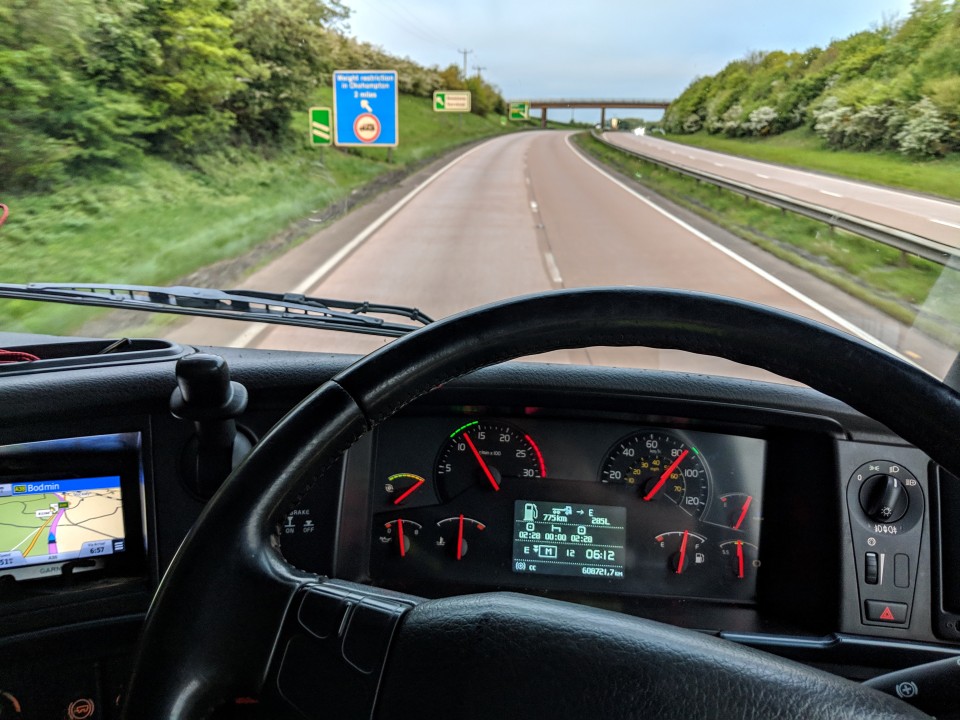
Susie Jones
¿Te aburres en la carretera?
Creado: 27/08/2024
•
Actualizado: 27/08/2024
El camionero medio pasa unas 12 horas diarias al volante. Un tiempo infinito en la carretera puede parecer atractivo, pero la realidad es muy diferente. Las innumerables gasolineras, áreas de descanso y largas horas pueden llegar a ser tediosas. Los camioneros suelen pasar su tiempo libre fuera de casa y evitar el aburrimiento puede ser todo un reto.
Según una encuesta reciente de Convoy, el aburrimiento es uno de los principales retos de los camioneros. ¿Qué efecto tiene el aburrimiento en el bienestar de los conductores? ¿Y cómo pueden entretenerse los camioneros?
Cómo afecta el aburrimiento al bienestar del conductor
La fatiga, el aislamiento, la soledad y la falta de estimulación mental son preocupaciones habituales de los conductores. Algunos conductores pueden hacer frente a estas preocupaciones con mecanismos de afrontamiento poco saludables, como comer en exceso, fumar o consumir cafeína en exceso. Con el tiempo, estos hábitos pueden afectar negativamente a la salud mental.
Sin embargo, a medida que se habla más de salud mental, cada vez son más los conductores que toman un camino diferente para combatirla. Hemos preguntado a los camioneros en Facebook qué hacen cuando les entra el aburrimiento.
"Audiolibros, sobre todo de psicología. Música, charlar con los seres queridos o escuchar la radio. O apago todo y tengo una existencia tranquila con mis propios pensamientos", dice Nigel.
Otros han mencionado cómo les ha ayudado hablar con sus seres queridos por teléfono. Ashleigh afirma:
"Hablar con mis amigos en un chat de grupo. Sinceramente, si no los tuviera, lo habría dejado hace mucho tiempo. El camino arroja algunas porquerías y sin hablar con amigos realmente buenos nunca habría sobrevivido".
Del mismo modo, Karl cree que "una charla en grupo con amigos es imprescindible".

Prevenir el aburrimiento al volante
Contrariamente a la creencia popular, el transporte por carretera es una actividad física: los conductores necesitan coordinación y concentración para evitar accidentes. A pesar de ello, estar al volante durante periodos prolongados puede provocar fatiga. Puede existir el riesgo de caer en la autocomplacencia en el trabajo, sobre todo si el conductor conoce bien su ruta. ¿Cómo pueden los conductores hacer frente a la autocomplacencia al volante?
Ya sea escuchando un podcast o una melodía pegadiza, los conductores deben elegir algo que mantenga su mente alerta. Hemos recopilado una lista de cosas para evitar el aburrimiento al volante.
Podcasts: El camionero Marty escucha "docenas de podcasts" mientras conduce. Los podcasts son una forma excelente de cambiar las cosas y aprender algo nuevo. Echa un vistazo a esta útil lista de podcasts para camioneros
Música: "Música, música y música" es el remedio contra el aburrimiento de Richard. Ya sea escuchando la radio o cantando al ritmo de una lista de reproducción, la música es una forma excelente de mantener la mente despierta...
Tómate un descanso: Aunque los conductores tienen plazos estrictos y normas de tacógrafo, salir de la cabina cuando aparece el aburrimiento ayuda a la mente a volver a concentrarse.
Aburrimiento durante el tiempo de inactividad
Los camioneros se enfrentan a retos adicionales para entretenerse después de su turno. Es imperativo adoptar un enfoque proactivo para evitar el aburrimiento durante este tiempo. Hemos recopilado una lista de formas de pasar las horas.
Ubicación: Las paradas de camiones que ofrecen una amplia gama de instalaciones y un ambiente comunitario son una excelente manera de aliviar el aburrimiento. Algunas actúan como centro social donde los camioneros pueden compartir experiencias similares. Visite nuestra página de ubicaciones para ver qué instalaciones ofrecen nuestros socios de servicios SNAP.
Hacer ejercicio: Dar un paseo diario o ser creativo con tus entrenamientos puede evitar el aburrimiento y garantizar que te mantengas en forma y sano. Consulta nuestros consejos para mantenerte sano en la carretera
Servicios de streaming: Ponte al día con el último programa de televisión o navega por las redes sociales. Al camionero Steve le gusta "desplazarse y comentar en Facebook y ver Netflix" para pasar el rato.
Aficiones: Las posibilidades son infinitas. Aprender un instrumento, aprender una lengua extranjera, dibujar, escribir y mucho más. Practicar un hobby es una forma eficaz de evitar el aburrimiento.
Cocinar: Cocinar en la cabina tiene muchas ventajas. No sólo evita el aburrimiento, sino que ahorra dinero y es más sano...
Manténgase en contacto con sus seres queridos: El tiempo de inactividad de un camionero ofrece la oportunidad perfecta para ponerse en contacto con sus seres más queridos. Las videollamadas son una forma eficaz de sentirse más cerca de la familia y los amigos
Relájese: Los camioneros pueden enfrentarse a situaciones estresantes. Relajarse por completo después de un turno puede mejorar el bienestar del conductor. Las técnicas de relajación, como los ejercicios de respiración profunda y la meditación, reducen el estrés.
Aunque algunos conductores disfrutan de la soledad y la independencia que ofrece la carretera, combatir el aburrimiento sigue siendo un reto para muchos. Debido a la naturaleza del trabajo, los camioneros experimentan a menudo largos periodos de aburrimiento. Sin embargo, para mejorar el bienestar, la satisfacción laboral y la seguridad vial, deben encontrar formas de paliarlo. Ya sea concentrándose en la tarea que tienen entre manos, escuchando la radio o charlando con amigos y familiares, la mayoría de los camioneros pueden encontrar una solución que les funcione.

¿Dónde duermen los camioneros?
La mayoría de los conductores duermen en sus cabinas, ya que están bien equipadas para pasar una noche cómoda. Una cabina dormitorio básica incluye una cama, espacio de almacenamiento, luces y tomas de corriente, lo que la convierte en un hogar lejos del hogar.
Debido a la actual escasez de aparcamientos en Europa, muchos conductores aparcan en los apartaderos. Hacerlo se considera inseguro y deja al conductor expuesto a robos. Desde noviembre de 2017, los conductores de vehículos pesados del Reino Unido deben hacer pausas de descanso semanales en áreas de descanso adecuadas (como áreas de servicio y paradas de camiones).
El sistema SNAP's Depot Parking permite a las flotas ofrecer sus plazas de aparcamiento de camiones a la red, aliviando la escasez y ayudando a los conductores a evitar situaciones vulnerables. Además, SNAP pone a disposición de los conductores más de 450 servicios asociados en toda Europa. Visite nuestra página de mapas para obtener más información.
¿Por qué los camioneros dejan abiertas las puertas de sus remolques?
Si alguna vez has conducido de noche por una carretera principal, habrás visto camiones aparcados con las puertas del remolque abiertas. Muchos conductores lo hacen para disuadir a los ladrones, suponiendo que si la puerta del remolque está abierta no hay nada que robar. Esto se hace sobre todo en los remolques con cortina lateral, ya que impide que los ladrones corten la cortina para ver lo que hay dentro.



